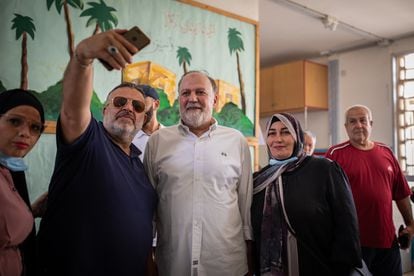Lebanese women line up to vote in Beirut's Shia district of Dahiye on Sunday. Oliver Marsden
In Lebanon, the elevators hardly work due to lack of electricity, except at the Hezbollah headquarters in Dahiye, a stronghold of the pro-Iranian militia-party in the Shiite districts of southern Beirut.
The electoral machinery of the organization has thrown the rest in the legislative elections this Sunday, the first to which the Lebanese have been called after the outbreak of a crisis that has placed the heterogeneous eastern Mediterranean country on the brink of the abyss of a State Failed three years ago.
"The voters will have the last word," the candidate Ali Ammar replied pleased at noon on voting day at the Grandan de Dahiye polling station, where dozens of voters grouped in separate queues of men and women cheered him on.
“I don't know why we vote here.
This is more than a plebiscite, it is a survey to verify that Hezbollah obtains more than 90% of the votes, as usual”, mocked Mohamed al Khanan, 47 years old.
"I'm going to vote for them too, but I'm afraid nothing is going to change," this expatriate businessman in Indonesia confessed in the crowded queue of a polling station "due to the complex security situation in Lebanon," passing through Beirut to visit to relatives.
Hezbollah candidate Ali Ammar poses with supporters this Sunday at a reading college in Dahiye, a Shia fiefdom in Beirut.Oliver Marsden
Ali Ammar's triumphal walk among the voters in the Shiite stronghold of Dahiye was interrupted from time to time by rapt mothers introducing him to their children.
"She has voted for the first time, and he has voted for you, may Allah bless you," one of them cheered.
Dozens of uniformed volunteers in yellow party-militia t-shirts directed the chaotic traffic of voters through the halls of the polling station and carried the elderly upstairs on stretchers, in chairs or on wings so that not a single vote was lost.
“We hope that the turnout will be higher than in the last elections,
Insha Allah!
(God willing) ”, the candidate said goodbye on the way to another voting center in his district.
In one of the tables, the participation was around 30%, five hours before the closing of the polls, at 7:00 p.m.
The crowded rows of the corridors contrasted with the parsimony of the voting ritual, in which the voters passed one by one before the tables inside the classrooms.
At the same time, the Lebanese Ministry of the Interior reported an average voter turnout of 25%.
At 6:30 p.m. he placed it at 37.5%.
At the Laure Megaishel school, in the predominantly Christian Beiruti district of Ashrafiye, barely 15% of those registered at 3:00 p.m. had cast their vote at a table inside a Red Cross tent planted in the courtyard of the hub.
"It is outrageous.
They are buying votes everywhere”, thundered MP and independent candidate Paula Yakoubian, a Christian of Armenian origin, during her visit to the Ashrafiye school.
"Who is it?
The usual ones ”, she answered without giving more details.
Yakoubian, 46, resigned as a parliamentarian after the explosion that devastated the port of Beirut in 2020. The traditional parties that share power in a sectarian system between Shiite and Sunni Muslims and Maronite Christians have so far blocked the investigation into a tragedy which caused more than 200 deaths and caused damages amounting to 5,000 million euros.
Participation was limited to 49% in the previous legislative elections, in 2018, when Hezbollah monopolized, along with Christian allies such as the nation's president, Michel Aoun, and Shiites, such as the Amal party, 71 of the 128 seats in Parliament. .
The specter of abstention hangs over the Sunni community in these elections, after his main candidate, former Prime Minister Saad Hariri, announced his withdrawal from politics last January.
"We are going to stand up to Hezbollah and prevent Hariri's votes from being lost," said candidate Michel Fallah, a 41-year-old lawyer with the Lebanese Forces, while campaigning in an area bordering Ashrafiye with a Sunni district.
He was surrounded by bodyguards from the Christian far right.
Fatima Shaban, owner of a fashion store, in line to vote this Sunday in Dahiye, a Shia fiefdom in Beirut.Oliver Marsden
At the polls in Dahiye, the businesswoman Fátima Shaban voted for the first time at the age of 23, in a country that still raises the age to exercise the right to vote to 21 years.
“I am going to vote for Hezbollah, of course, like almost all the women who are in this row, but I don't think it will do much.
The Lebanese parties are not going to come to an agreement to solve our problems”, explained this owner of a “hijab fashion” store (with an Islamic veil) among the complicit smiles of the rest of the voters.
Although many independent and opposition candidates aspire to attract the disaffected vote of poverty-stricken citizens, the division among their ranks makes it difficult for most of these lists to receive at least one parliamentary act in an electoral system that favors traditional parties. denominational.
The crisis in Lebanon, the worst since the civil war that bloodied the country between 1975 and 1990, has plunged 80% of its 4.5 million inhabitants and almost all the refugees — more than a million Syrians and nearly 300,000 Palestinians. — below the threshold of extreme poverty.
The pound, the national currency, has lost 90% of its value against the dollar in the last three years and inflation has exceeded 200%.
Hezbollah 's
number two
, Naim Qasem, announced before the polls closed that he would reach out to all political groups and accept the results without questioning them, in a clear anticipation that he took his victory for granted.
Follow all the international information on
and
, or in
our weekly newsletter
.
Exclusive content for subscribers
read without limits
subscribe
I'm already a subscriber

